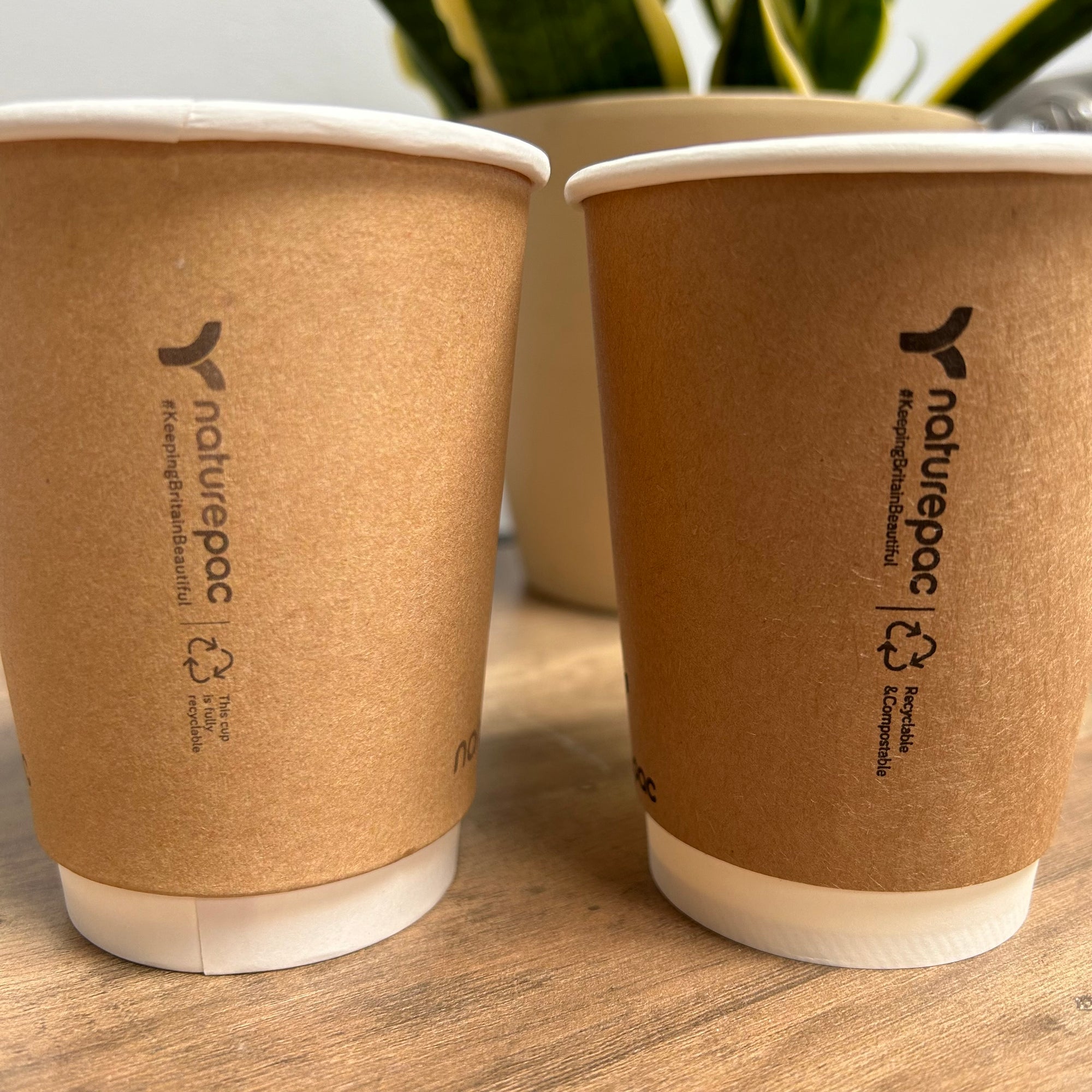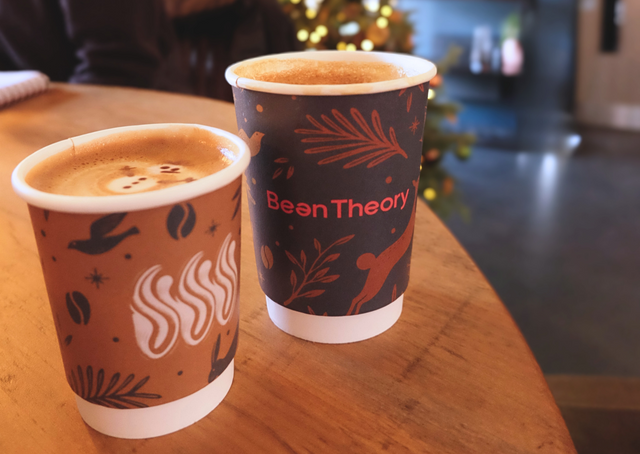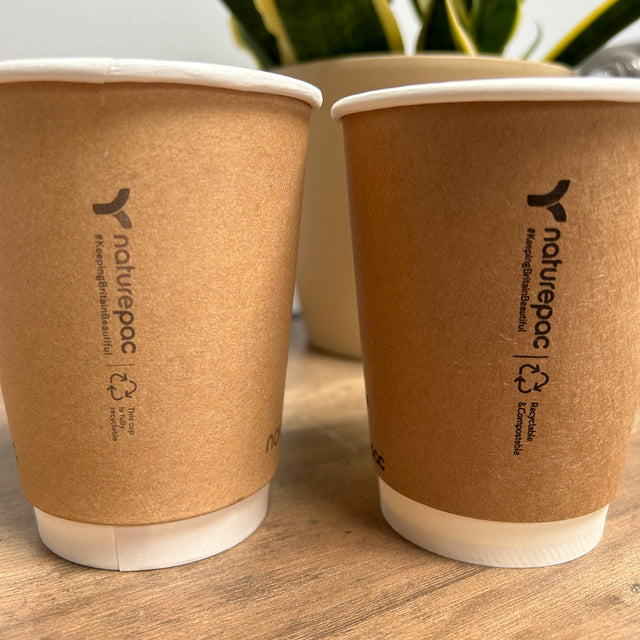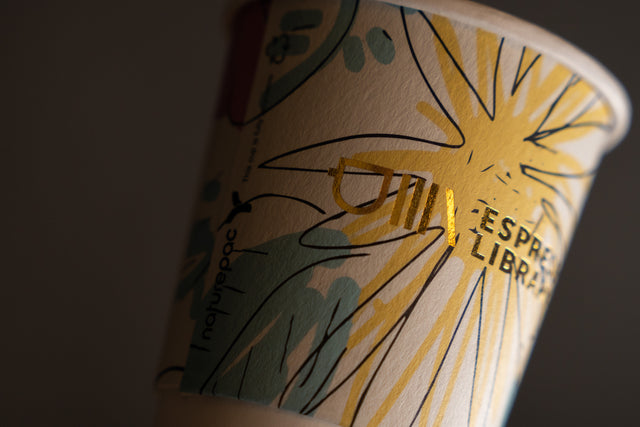
Industrially Compostable, Home Compostable or Recyclable... Which is better?
The answer... It depends!
I know this isn’t particularly helpful, but I am hoping the below will enable you to choose which is best for you, your business and your customers.
There are four main types of takeaway cup on the UK market now (June 2024). These are:
- Standard PE Lined
- Modified PE Lined
- PLA Lined
- Aqueous Coated
None of these are plastic free. There are some companies that claim the Aqueous coated cup is plastic free. There are some companies that will say they have the certification and print on the cup that it is plastic free.
This is not the case.
What they have done is found a loophole in testing criteria which means the polymers (plastic) are so small that they fit through the sieve at the end of the testing process which is designed to collect the plastic from standard cups. As no plastic is collected, they are claiming the cup is plastic free.
At NaturePac we do not market the Aqueous coated cup as plastic free. It is certified as Home Compostable. However, because of the reason above, we do not recommend customers to compost this cup as it will lead to micro-plastics getting into the soil. The Aqueous cup is also recyclable within normal wastepaper streams, however, it is our understanding that some recyclers do not like this type of cup because the coating can be difficult to remove from the paper. This means the recycled paper quality may not be as good as they can get from other types of cups.
PLA Lined Cups – these are becoming less and less common. They are required to be industrially composted. They will not break down and compost if littered. PLA is a type of plastic which is made from renewable resources such as corn starch and designed to break down into carbon dioxide, water and biomass when industrially composted.
The reason they are becoming less common is because of the very limited number of specialist facilities which can compost this type of material. Recyclers do not like PLA lined cups as they need to go through the same specialist process as standard PE lined cups, and the PLA then contaminates and degrades the quality of the PE they get from standard cups. This may mean the whole batch of the PE will need to be disposed of instead of being used again for another application.
The best time to use a PLA lined cup is when you can ensure you have a closed loop system and your waste management company will sort them and take them to be industrially composted. This could happen on sites like universities campuses, festivals, stadiums, etc... The main issue with this though, is there is still a possibility that customers bring in different cups from outside the site which are not compostable and so will contaminate the composting process.
Standard PE Lined Cups – these are the cups which all the big high street coffee brands use. Because of this, in the UK we are actually pretty well set up for recycling these cups. There is a big recycling facility, James Cropper, which recycles most of the big brand cups in the UK. As they have improved how to separate the PE liner from the paper, they now get very high quality recycled paper from the cups and the left over PE can also be recycled and used again.
Standard PE lined cups do need special treatment to be recycled properly. They are unable to be recycled with normal waste paper and so it is important they are sorted correctly and taken to the right facility (much like industrially compostable cups, however, there are more facilities for recycling these cups and the UK is more set up for recycling). Here in Cambridgeshire, it is our understanding from talking to Amey, who manage the council’s waste, they sort all paper cups and send them all off to be recycled with James Cropper.
This is when a PLA lined cup (and to a lesser extent the Aqueous cup) could cause issues with contamination.
Modified PE Lined Cups are very similar to the standard PE lined cups, however, the PE liner is manufactured in such a way that it is normally 50% liner than standard cups and adhered to the paperboard in a way which makes it easier to remove during the recycling process. This means, the Modified PE lined cups can be recycled with normal wastepaper, without any special treatment, and they contain up to 50% less plastic. If they get mixed in with standard PE lined cups, this isn’t a problem as they won’t contaminate the recycling process as they are made from the same materials.
The main issue with these cups, just like the standard PE lined cups, is that the PE is oil based and so if it is littered it will stay within the environment until it is collected. It also means that the PE element of the cup is not renewable.
The Future:
We understand there is progress with ‘Green PE’, which is a type of PE which is made from renewable resources. Depending on what these resources are, it might be it is sustainable. It should also perform to the same standard as PE and also be recycled in the same way. This will mean we do not need to change our existing recycling processes.
The other big development is by Notpla. They are making a seaweed based ‘plastic’ which has the potential to really disrupt the industry, which we are looking forward to! At the moment, we don’t believe they have been able to make a cup which doesn't leak. The other main issue would be keeping up with demand and what size area they would need to plant the seaweed in?
What does NaturePac supply?
We have two main offerings. The Aqueous Coated cup for customers who are wanting a compostable option, which can also be recycled.
The other option, and our most popular, is the NaturePac Premium Recyclable Cup which is a modified PE lined cup.
We have chosen these two cups because they can both be recycled within the existing processes within the UK and most people have access to recycling bin, either on the street or at home. Plus if someone would like a compostable cup, the Aqueous will work for them, although, as stated above, we highly recommend recycling over composting coffee cups.
Both of these cups are available to be custom printed with your logo and details.
If you wish to discuss this further, and/or if you have any questions, please feel free to contact us on 01480 710035 or email support@naturepac.co.uk



